Ireland’s six sailing Olympians have reached their selections for the 2016 Games at different times. Some have been secure with their places for many months, while others have been confirmed more recently, with the final place being filled on May 18th. Now, if all goes according to plan, for the next six days they’ll be at some remove from the petty hassles of everyday life, safe in a cocoon of mental and physical security as the clock ticks steadily on towards their appointment with destiny. The official opening of the 2016 Games is in Rio de Janeiro next Friday (August 5th). Then for the ISA squad, it’s into practice races and the start of the Sailing Olympiad on Monday August 8th. W M Nixon takes an overview.
The Olympic Games are very important for Irish sailing. Some would say disproportionately so, while a few contrarians might even argue that, as a vehicle and equipment sport as much as a physical pursuit, sailing is questionably Olympian in the first place, and certainly not mainstream.
Perhaps. But for a specialist sport like sailing, the Olympics provide a unique four year opportunity to be in the national and international limelight. Over the years, we’ve learned that an Olympic Medal – or even the prospect of one - is a matter for general interest and celebration regardless of how the sport in question is perceived by the general public at home.
Like it or not, the Olympics simplify it all. And the value of winning a medal, even the most modest one, is almost beyond quantification. But at the very least, if at the Olympics you put in an honourable performance, clearly give of your very best, do your uttermost as part of a warm human story, then your sport’s feelgood factor rises to provide new levels of interest and tangible support at official level.
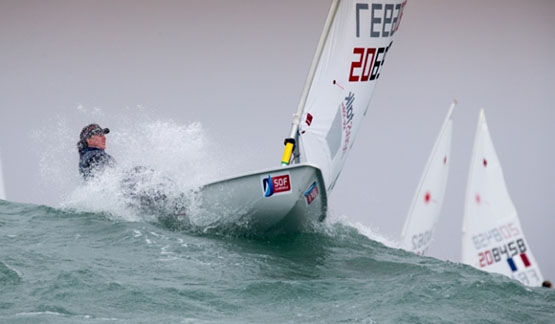 The Olympics may reduce sailing to its basics, but when a medal seems a possibility – as for Annalise Murphy in 2012 – suddenly our specialist sport comes centre stage at national level
The Olympics may reduce sailing to its basics, but when a medal seems a possibility – as for Annalise Murphy in 2012 – suddenly our specialist sport comes centre stage at national level
But how can Olympic sailing project itself as something of particular human interest? It’s simple. People want a people story, and while sailors will happily discuss the minutiae of boat design, sail shape and equipment structure for hours on end, Joe and Josephine Public think a boat is just a thing, and an odd, often wet, and uncomfortable thing at that. They want a human story with which they can identify, and if they don’t get that human story - and quickly – their interest will immediately move elsewhere, for there’s any amount of ready distraction in today’s world.
Time was when the Olympics were about catering for the needs of the athletes, but now the demands of an instant global audience dictate everything. And time also was when the sailing Olympics had at least as many keelboat classes as it had dinghies, and the venue was selected at locations sometimes hundreds of miles from the hosting city in order to provide “ideal” sailing conditions.
But in this age of cities, the demands of the glamour city dominate, and if the host city happens to be picturesquely beside the sea, then that’s where your sailing will be, regardless of the effect of a steep coastline and high buildings on the winds of the race area.
As for keelboats in the sailing Olympics, forget it. Ballast keels reduce the need for athletic capability. And forget individuality and a sense of ownership in boats. Today’s Olympic sailing ideal is exemplified by the Laser, with anonymous newly-manufactured utterly standard boats, sails and masts allocated only days before the event, thereby making the athleticism and ability of the sailors the paramount factor, rather than having any technological edge in boat and equipment.
This paring-back of our beloved sport means that the inevitably ageist structure of the modern Olympic sailing team is not at all representative of the true overall picture of modern world sailing, with its themes of a Sport for Life, and Love Your Boat. With our global spread of 143 different boat classes entitled to hold a world championship, sailing is something of a mystery for the rest of the world. Yet it’s only with the artificially-imposed simplicities of Olympic sailing that we get a chance to explain what it might be about.
Or more accurately, we get a chance to see how the general run of journalists respond to sailing. For it’s only with the very big things of popular interest like the Olympics and maybe the America’s Cup, and perhaps disaster stories like the Fastnet Race of 1979, that your solitary sailing journo gets to rub shoulders with other journalists. So when the ISA staged a Press & Radio Conference this week for the media to meet and question the 2016 Olympic Sailing squad, we went along not to ask questions ourselves, but rather to hear what sort of questions these inquiring representatives of the outside world would ask about sailing.
It’s ironic, but once upon a time it was thought that yachting reports should really appear in the social and gossip pages rather than in the sports pages. Yet today, thanks to its involvement in the Olympics with that nationally-electrifying almost-Medal of 2012 and the ever-increasing emphasis on human stories, sailing is now accepted in Ireland as a proper sport.
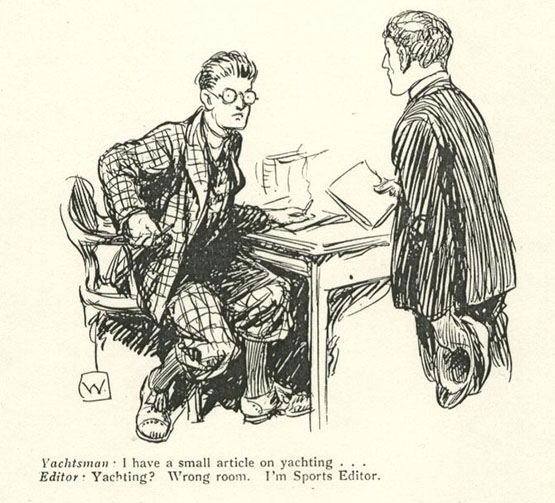 Once upon a time, it was thought that sailing was best reported in the social and gossip pages...
Once upon a time, it was thought that sailing was best reported in the social and gossip pages...
But the reality beyond that is that all sports, sailing included, are now being reported with the emphasis on the human angle rather than on the athletic and technical issues, though of course good old-fashioned winning is still paramount. But as for how that win is achieved – well, open any sports section of a print newspaper (remember them?) and most of the photos will be of people, frequently in facial close-up and showing extreme reaction to some incident or achievement which is of itself so incidental that it is seldom illustrated.
Thus we’re getting to the stage that serious newspapers are veering away from carrying anything like old-fashioned social diaries. Today any event – whether it be a sports championship, company annual general meeting, or a major political announcement – is reported as though it belongs in the social diary, becoming just another happening in the daily progress through the world of the nation’s social life.
So although Tuesday’s press conference made token gestures of getting to grips with how our youngest Olympic sailor Finn Lynch seems to do all his main training in Croatia, and whether or not Annalise Murphy has been made ill by the fact that she has put in significant time during the past three years training in the polluted waters of Rio de Janeiro (she hasn’t), really what the press corps wanted was human stories based on past events to which their readers could relate, and happily for Irish Olympic sailing, our team could come up with the goods.
Thus next morning’s papers came up with a story in the general news pages about how Saskia Tidey continues to draw inspiration from her 81-year-old kidnap-surviving dad Don, while another paper had the sports pages telling of how Annalise Murphy came within a whisker of winning the Bronze in 2012, but then came to terms with it, put it behind her, and went into the dedicated count-down towards Rio 2016.
 Andrea Brewster and Saskia Tidey, 49erFX Olympic crewAs for the 49er guys from the north, Ryan Seaton & Matt McGovern, they provided oodles of copy about just how they’ve managed to stay together for so long to such an extent that you could see a spectral “The Odd Couple” sign hovering over them during their part of the show.
Andrea Brewster and Saskia Tidey, 49erFX Olympic crewAs for the 49er guys from the north, Ryan Seaton & Matt McGovern, they provided oodles of copy about just how they’ve managed to stay together for so long to such an extent that you could see a spectral “The Odd Couple” sign hovering over them during their part of the show.
And then to give everyone a warm community feeling, we’d the real page-turner of how Finn Lynch of Bennekerry in County Carlow comes to be the youngest sailor in Ireland’s Olympic squad. As the details of that were teased out, we may have learned more about the GAA in Bennekerry and the little sailing club in Blessington than we did about the Laser in Rio. But if the purpose of Tuesday’s gathering was to give Irish Olympic sailing a friendly and responsive human face, then Finn Lynch and his team mates have won gold in the social stakes already.
 Profoundly rural – Finn Lynch’s home county of Carlow
Profoundly rural – Finn Lynch’s home county of Carlow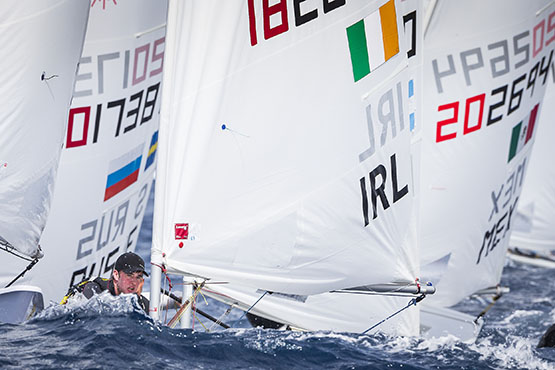 The Young Man and The Sea – Finn Lynch takes the Olympic Laser place in Mexico on May 18th
The Young Man and The Sea – Finn Lynch takes the Olympic Laser place in Mexico on May 18th
Their boats? At the conference, boats were very quickly shunted aside in the pursuit of human stories. Boats are trouble enough to comprehend, sailing boats are double trouble. The problem with sailing boats is sails. Mysterious sails harnessing the invisible wind can make the straightforward fact of Olympic participation into something very weird.
With rowing, by contrast, you may have boats, yet it’s so obviously sheer athletic prowess which brings rowing success. But sailing? For sure, athletic ability, training and coaching are more important than ever. But sails and the wind remain firmly in the region of the sacred mysteries. Thus far from trying to group sailing together with rowing and swimming as water-based sports, it’s arguable that the only Olympic area which shares a unique complexity with sailing is equestrianism, for a sailing boat can seem as much of a living thing as a horse.
So how are our sailors of the sea horses going to do in Rio? As Annalise Murphy has more experience of the venue than anyone else, her opinions were of special interest. She crisply dismissed any grumblings about the flukiness of the sailing waters by saying that the unpredictability is so general in sailing in Rio’s winter (or what passes for winter when you’re near enough to the equator) that in the end it’s the same for everyone.
Certainly she’s giving it her best shot, and she has benefitted – as have all the Irish sailing squad - from the involvement (intensive in her case) of uber-coach Gary Keegan of the Institute of Sport. He’s leaving the Institute for a new venture after the Olympics, but for now, he has helped guide Murphy to peak form, thanks to a closely-controlled weight reduction programme as part of a carefully-monitored training plan which, at Tuesday’s conference, had the Irish sailor looking extremely fit and well, with her mental outlook in a very good place.
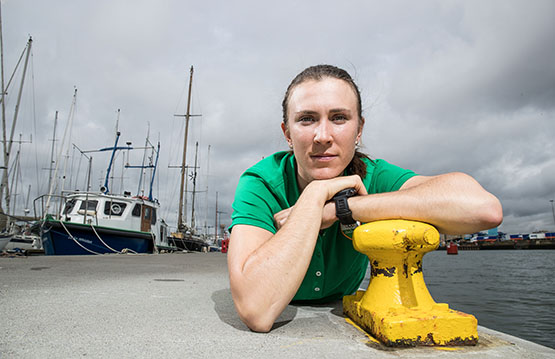 Annalise Murphy in thoughtful mood on Tuesday. Photo: Dan Sheridan/INPHO
Annalise Murphy in thoughtful mood on Tuesday. Photo: Dan Sheridan/INPHO
Inevitably the new-look Murphy has to be the most likely medal prospect, for despite her significant height, she’s certainly rated as a contender by her peers. Of the rest of the team, the two 49er guys have shown they can do it, they won the gold in Palma in April but have been erratic since, yet with the selected nature of the Olympic fleets, they could well be on the money.
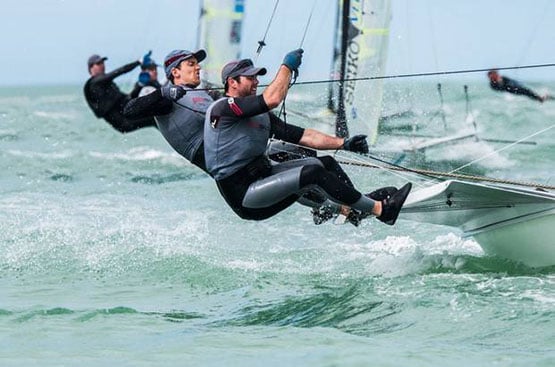 Ryan Seaton and Matt McGovern keeping busy
Ryan Seaton and Matt McGovern keeping busy
Andrea Brewster and Saskia Tidey on the women’s skiff made it into the Olympic qualification by the skin of their teeth, but if a sporting outlook and gallant determination are keys to success, then their showing will have an added interest.
While the rest of the team have been on the scene for a while, Finn Lynch is the new kid on the block. But despite only turning twenty back in April and then not getting his Olympic qualification until May, he has been maturing before our very eyes ever since he started this particular journey a year ago.
The Finn Lynch story just builds and builds, for not only is he the youngest member of the Irish sailing team by far, but he is competing in the most numerous class as the Lasers will be mustering 46 boats at Rio. And he will find himself racing in the distinguished company of one of the most popular sailors in the world, Brazil’s legendary Robert Scheidt, who at 43 will be the oldest competitor in the Sailing Olympics 2016.
There are great stories already there. And there could be some mighty stories in the making. As ISA Performance Director James O’Callaghan put it, it may be very much an outside shot, but we might even be due a medal. Either way, our dedicated Olympic squad – sailors and coaches alike – have brought sailing centre stage in the Irish consciousness for the next three weeks. But for now, they’re very deservedly in seclusion even if, in the outside world, the rumour mills will inevitably grind on.
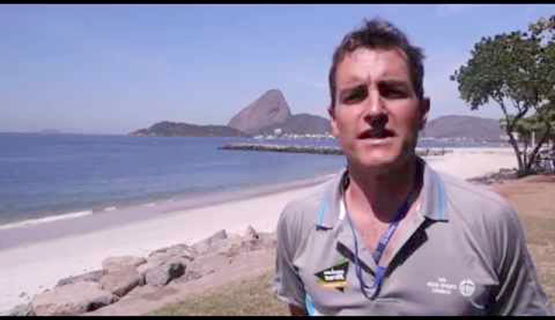 ISA Performance Director James O’Callaghan in Rio de Janeiro
ISA Performance Director James O’Callaghan in Rio de Janeiro
































































